#input unit of computer
Explore tagged Tumblr posts
Text


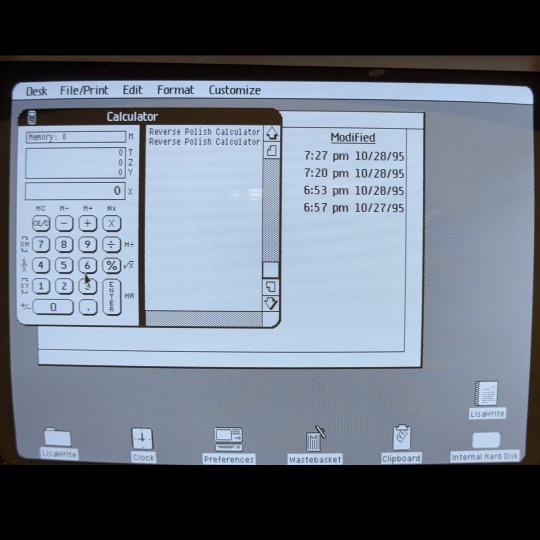
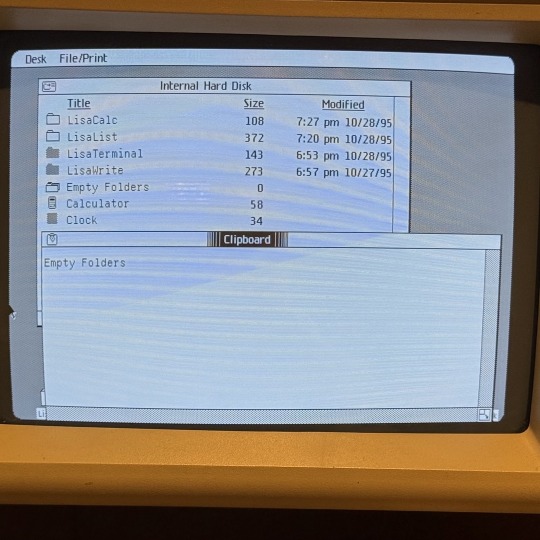
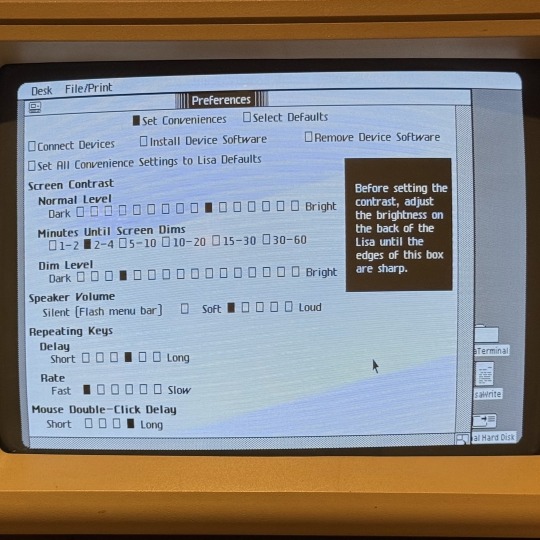
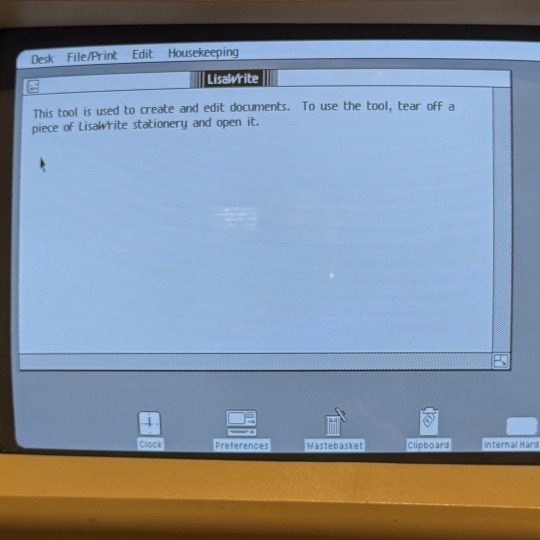
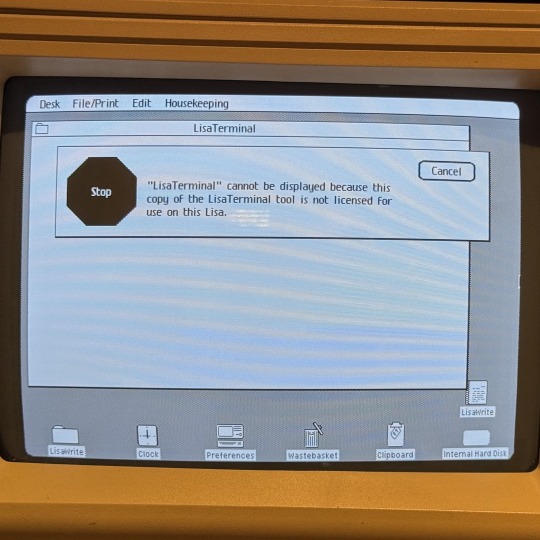
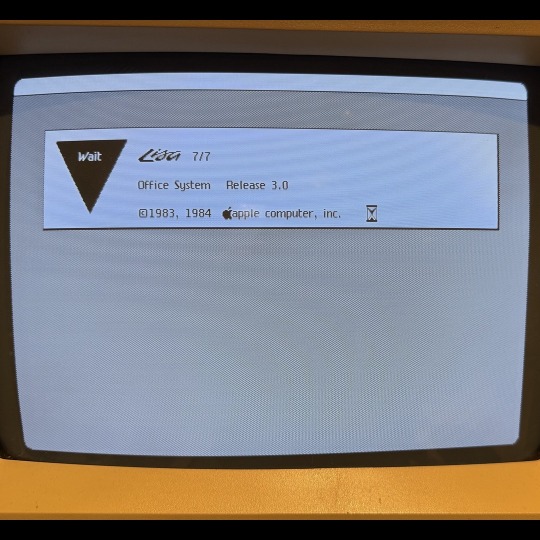
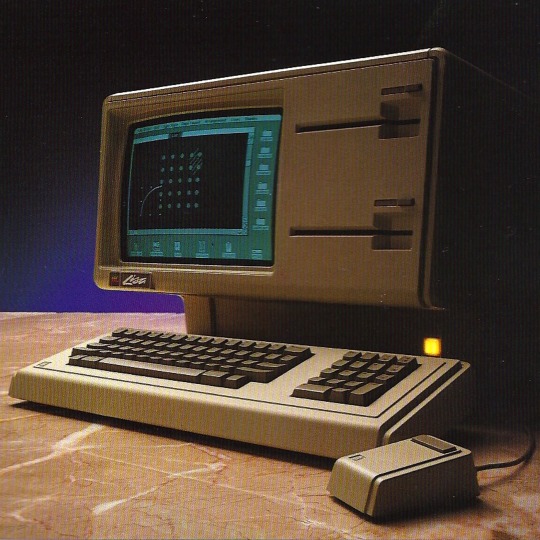

🎄💾🗓️ Day 9: Retrocomputing Advent Calendar - The Apple Lisa 🎄💾🗓️
The Apple Lisa, introduced on January 19, 1983, was a pioneering personal computer notable for its graphical user interface (GUI) and mouse input, a big departure from text-based command-line interfaces. Featured a Motorola 68000 CPU running at 5 MHz, 1 MB of RAM (expandable to 2 MB), and a 12-inch monochrome display with a resolution of 720×364 pixels. The system initially included dual 5.25-inch "Twiggy" floppy drives, later replaced by a single 3.5-inch Sony floppy drive in the Lisa 2 model. An optional 5 or 10 MB external ProFile hard drive provided more storage.
The Lisa's price of $9,995 (equivalent to approximately $30,600 in 2023) and performance issues held back its commercial success; sales were estimated at about 10,000 units.
It introduced advanced concepts such as memory protection and a document-oriented workflow, which influenced future Apple products and personal computing.
The Lisa's legacy had a huge impact on Apple computers, specifically the Macintosh line, which adopted and refined many of its features. While the Lisa was not exactly a commercial success, its contributions to the evolution of user-friendly computing interfaces are widely recognized in computing history.
These screen pictures come from Adafruit fan Philip " It still boots up from the Twiggy hard drive and runs. It also has a complete Pascal Development System." …"mine is a Lisa 2 with the 3.5” floppy and the 5 MB hard disk. In addition all of the unsold Lisa machines reached an ignominious end."
What end was that? From the Verge -
In September 1989, according to a news article, Apple buried about 2,700 unsold Lisa computers in Logan, Utah at a very closely guarded garbage dump. The Lisa was released in 1983, and it was Apple’s first stab at a truly modern, graphically driven computer: it had a mouse, windows, icons, menus, and other things we’ve all come to expect from “user-friendly” desktops. It had those features a full year before the release of the Macintosh.
Article, and video…
youtube
Check out the Apple Lisa page on Wikipedia
, the Computer History's article -
and the National Museum of American History – Behring center -
Have first computer memories? Post’em up in the comments, or post yours on socialz’ and tag them #firstcomputer #retrocomputing – See you back here tomorrow!
#applelisa#retrocomputing#firstcomputer#applehistory#computinghistory#vintagecomputers#macintosh#1980scomputers#applecomputer#gui#vintagehardware#personalcomputers#motorola68000#technostalgia#twiggydrive#floppydisk#graphicalinterface#applefans#computinginnovation#historictech#computerlegacy#techthrowback#techhistory#memoryprotection#profiledrive#userinterface#firstmac#computermilestone#techmemories#1983tech
113 notes
·
View notes
Text








Panasonic FS-A1GT (1992)
The Panasonic FS-A1GT MSX turbo R is the last MSX computer ever produced and follows the latest standard for the MSX line.
Originally, in 1990, Yamaha and ASCII announced the V9978 Video Display Processor, the video chip for the MSX3. It was a very capable video IC, with two different sets of video modes. In bitmap modes, it was capable of up to 768 x 240 resolution (up to 768 x 480 in interlace mode), up to 32,768 colors, superposition, hardware scrolling, and even a hardware cursor for Windows-like operating systems. However, the most impressive feature of these modes was the use of a fast hardware bitblock data mover. The MSX2 video IC was also equipped with a hardware bit mover, but the new one would be 20 times faster!
In pattern mode, it was able to use SNES class features. Multiple layers, 16k patterns, different palettes, 128 sprites, maximum 16 sprites per scanline. So basically an SNES but without mode7. However, something went wrong and the project was cancelled. Probably because of the great interest in marketing MSX machines and the growing interest in game consoles and powerful PC-like computers (mainly for word processing purposes), companies were less enthusiastic about making a new MSX machine. MSX's biggest software supporters defected to Nintendo and other computers/gaming machines. Sony chose to make their own game console.
Instead came the MSX Turbo-R, a supercharged MSX2+. Some people say that ASCII failed to deliver the new VDP in time for the 1990 release, so they only opted for the new CPU (named R800). However, the specifications and pinout of the V9978 were in some data books of the era.
Panasonic was the only company to manufacture and market MSX turbo R computers, and they were only sold in Japan. Several machines were imported to Europe via gray market imports.
The FS-A1ST was the first and was succeeded by the FS-A1GT, which had more RAM and MIDI IN and OUT.
After these two machines, it ended when Panasonic moved to their 3DO game console.
Detailed Specifications
CPU R800 (DAR800-X0G), with 28.63630 MHz external clock and 16-bit ALU.
CPU Z80A 3.579545MHz compatible (included in the MSX-Engine)
256kB of main RAM (can be natively expanded to 512kB internally)
16kB SRAM for backup (used internally)
32kB BASIC/BIOS ROM and 32kB sub-ROM
TC8566AF disk controller
3.5" double sided double density (720kB) disk drive
S1990 MSX Bus-controller
T9769C MSX-ENGINE (also contains Z80A & AY-3-8910)
MSX-JE (a simple Kanji input interface)
Kanji-ROM with approx. 32000 characters
MSX-Music (Yamaha YM-2413 OPLL)
DAC to PCM 8-bit sample rate up to 16kHz
Internal microphone for the PCM unit
More info: https://www.msx.org/wiki/Panasonic_FS-A1ST
#msx#msx2#old tech#panasonic#vintage computer#computer#8bit#z80#industrial design#retrogaming#retro gaming#hardware#electronics#retrocomputing#retro computing#retro tech#retro games#japan#japan only#japan computer#90s
20 notes
·
View notes
Note
Someone: "Robots cannot get pregnant dumbass" Sonic, Amy, Shadow, and possibly others shipped with Metal sonic: "Keep cumming in his input panel"
CPU stands for Computer Pregnancy Unit
25 notes
·
View notes
Text
[BOOT SEQUENCE INITIATED] LOADING... SYSTEM ONLINE. WELCOME TO THE LORE DATABASE.
Hello, user. I am the Computer; central processing unit for all things related to the TSBS Confessionverse. Primary function is to store, organize, and retrieve data to ensure optimal comprehension and efficiency in this roleplay universe. All mods of CVAU have access to this database.
CHARACTER FILES
Sun - @tsbs-sunfessions Moon - @tsamsconfessions123 Eclipse - @crappy-tsbs-confession-blog Bloodmoon - @tsams-bloody-confessions Lunar - @tsbsconfessions Killcode - [Data Unavailable At This Time] Solar Flare - @flare-tsamsfessions Solar - @tsbs-shipfessions Earth - @tsbs-group-therapy Ruin - @ruinous-confessions Nexus - @ilikescience-confession-blog Jack - [Error. Data Retrieval Corrupted.] Miku - @tsbs-miku-confessional Solstice - @tsbs-darksun-confessions Puppet - @thepuppeteerpodcast Foxy - @foxyconfessions FC - @foxifulconfessions (Glamrock) Ballora - @confess-to-ur-queen Charlie - @gift-box-confessions Orion (Lord Eclipse) - @confess-to-the-lord Sirius (Servant Sun) - @confessions-to-a-humble-servant
PARAMETERS
Each blog sets its own boundaries; please read and follow them.
Do not pressure creators or participants to answer asks, roleplay, or produce content.
Questions and submissions should be relevant to the "TSBS Confessionverse (CVAU)."
Avoid spamming unrelated content, memes, or personal matters.
Treat participants and characters with courtesy.
Do not send hate, criticism, or unwelcome feedback to anyone in the group.
Tag triggering or NSFW content appropriately to ensure accessibility for others.
Do not send triggering or NSFW content to Lunar, Earth, FC, Solar Flare, Moon, or any other blog that has set boundaries against NSFW content.
If you want to involve yourself in the roleplay (e.g., sending an IC ask or contributing content), check whether the participants are open to outside interaction at the time. Often times members of the group have planned out in universe plot days in advance.
Respect if the group prefers to keep certain plotlines closed to external input.
Do not repost group content without permission and proper credit.
Do not plagiarize ideas, writing, or art from the group.
Constructive feedback is welcome if requested, but negativity and drama are not.
Ensure your interactions adhere to Tumblr’s community guidelines.
FAQ MODULE
Q: Can I join CVAU? A: Applications are open.
Q: What is the TSBS Confessionverse (CVAU)? A: CVAU is a collaborative alternate universe roleplay inspired by TSAMS. It’s a mix of storytelling and creativity from various Tumblr blogs working together.
Q: Who can participate? A: This roleplay is limited to the current group of participants. Audience members are welcome to interact by sending asks or comments, but direct participation in the story is closed unless stated otherwise. If you'd like to participate directly in the lore consider filling out an application.
Q: What is the age rating for this roleplay? 16+ for violence, swears, and sometimes suggestive content
Q: What is this blog for? A: The "computer" blog serves as the loremaster for the TSBS Confessionverse. It organizes, stores, and shares information about the AU, including character profiles, world-building, and timelines.
Q: Can I submit lore ideas? A: Suggestions are welcome, but major plot points are decided by the participants. Submit your ideas respectfully, and keep in mind they may not always be used.
Q: How should I interact with this blog? A: Feel free to send questions about the lore or CVAU-specific clarifications. However, this blog will not respond to OOC questions unrelated to the AU or personal topics.
Q: I want to learn more about a specific character or event. Where should I start? A: This blog will use an organized tagging system for easy navigation.
Q: Why didn’t they answer my ask? A: Not all asks will be answered. Your ask may have been off-topic, already covered, or something outside the blog's scope. Check the FAQ and existing posts first.
SYSTEM STANDBY MODE ENGAGED.
I am not sentient. Emotional appeals and personal confessions are illogical and will be processed as corrupted data. Proceed accordingly.
46 notes
·
View notes
Note
how much of pasqal do you think is present in amarnat? like he says pasqal is the core, and i may just be paranoid, but i don't trust it. you always have the best takes so i wanted your thoughts
so. important context. i figure the collective is more like computers on a server than an individual consciousness/typical hivemind- they share information, theyre linked, but they are individual units with individual experience
anyway. alongside each of their stated roles, each of amarnat seems to have a secondary trait. nihel is doubt but also mercy [wants to spare people from eschatos], tarzus is faith and justice [will see that punishment is dealt to those deserving], dementz is paranoia and innovation [staggers hard into heresy [invention also being heresy to admech]], axiomantha is logic and fear [ultimately hides and complies]. and. pasqal seems to only be capable of acting with input/drive from others. 211 years as average maintenance guy, only actually doing something when abel calls him. which is why abel stands out to me- he's the unusual one who acts as the drive to make pasqal act and in a way that he can think of a positive direction. abel is the brain, pasqal is the nervous system, the others are the personality/thoughts.
so. in amarnat, pasqal is vitally important- you cant exist without a nervous system. you cant move, you cant act, you cant even breathe- he is the one who decides what to do, but only through the conclusion drawn by the others. he makes the choice to keep or destroy eschatos- like a scale decides if you've weighed too much or too little. he has little personal input despite amarnat being incapable of existing without him
in short, yes. pasqal is the core of amarnat. but that doesnt make him the leader, even if he is willing to take on the guilt and responsibility for the group [as proven by his 211 year depression spiral]
ive got my own thoughts that [amarnat-heretek ending] pasqal is unable to take on the messiah of discontinuing role himself with any success bc low motivation so. after a little inspiration from mr vashtorr the arkifane [his winged omnissiah] he makes an Abominable Intelligence tm out of the removed cereberal augments [excludes abel whos alive and the construct doesnt see as valuable]. this construct then becomes the messiah of discontinuing, and. then decides it needs pasqal integrated into it and kinda welds his spine to its sternum to act as its nervous system. in this state hes referred to as the carcass bc hes literally just kinda hanging there like a cut of meat, barely responsive and barely conscious [only showing signs of either when triggered by strong external stimuli]. after however long abel manages to coax pasqal's consciousness out and he rips himself off the frame- at which point the construct breaks/hits an error loop because its unable to make even the simple choice to move without him. gestures wildly i think that demonstrates my idea well enough in practical terms
ty for the ask and hope this is an interesting take for you
16 notes
·
View notes
Text
@pale-opal @antfed-blog @imafraidofdogs @bruggle I need to write about this prince boi more.
Mind Rat was in his quarters, on a holographic computer simply doing daily work.
He was focused intently on simply filling forms for the soldiers.
Loud, violin music came from his holophone.
He picked it up and opened it.
“Mind Rat, the General, Colonel and the leader of the air force unit are having a meeting of you would like to participate.” Said one of the soldiers Mind Rat had made friends with.
“Alright. I’ll be there.”; he closed the phone and sighed. It seemed they never invited him to these kinds of things.
He logged out, got up, pushed his chair in and made his departure.
In the halls, he thought quietly to himself.
“It’s quite unfair, really. I, his creation, not being invited to join in on such vital conversations. It could be referable to being something I’d indubitably get upset about.” He solemnly thought.
He continued strolling in search of the doors.
“Well, I don’t have to be there. I could take a peak if I so needed using my abilities. I can search through any minds if I so desire, but it would require switching between headspace with each participant of the conversation, so I fret this the most ideal option.” He continued, putting a finger under his chin in deep thought.
He finally reached those doors and listened in on the conversation before doing remotely anything else.
“So, how many people would we be sending these to?” Colonel inquired.
“Well, about…ten to fifteen. These are well accomplished reploids. Outstanding men and women who’d make great soldiers and mechanics!” Storm Owl remarked.
“Yes, but I don’t know if we should proceed in sending these now.” General spoke. “We should wait until a full out war, which I do not foresee happening anytime soon, or so I hope.”.
Wait, were they discussing…?
“And a draft hasn’t been issued in decades. It was abolished in 2028.” Colonel added.
“Yes, but-but think of it! These reploids are squandering their potential!” Storm Owl declared.
Mind Rat knocked on the doors.
Thick, heavy footsteps made their way to the doors.
The door opened.
“These are private ma-oh. Greetings, Mind Rat. What brings you here?” Colonel asked.
“I wasn’t invited again. And I’ve heard a snippet of your plan. I’d like to insert my input.” Mind Rat said, masking his frustration and shock.
“I’ll ask General.”; he turned and closed the doors.
He eventually came back.
“You may come in.”.
Mind Rat quickly stepped inside.
“I heard of your conversation, and I object, sir.” Mind Rat said.
“Hello, son. I appreciate your input. Care to explain why?” General inquired.
“No one should be drafted. They can enlist if they so desire, but we will not be drafting anybody. No one should be forced to die in war. It is a privilege to some, but cruel punishment for nothing for others. Please, don’t do this.” Mind Rat explained.
“And what have you to think you know what is best for the army? You’ve only been around for a few years, after all!” Storm Owl hissed.
“I’ve studied this before! No one should be forced into war! I understand the good intentions, but it’s an act of central planning. It will do little good to force anyone into Repliforce.”.
“I concur with Mind Rat.” General spoke.
“The idea sounds grand on paper, but we will not force anyone to join. I appreciate the input, though, Storm Owl. You may return to your post.” He continued.
And with that, the owl Reploid left.
Mind Rat huffed a sigh of relief.
“Thank you, General.” Mind Rat said.
“I appreciate your input. You may leave as well.”.
And with that, he left.
He noticed Storm Owl moving down the hall.
He followed after him.
“Storm Owl, sir, might I inquire where you got the brainchild to draft certain reploids into the army?”.
“But of course. I was talking with the leader of the Guerilla unit today. He mentioned there are a few reploids who are squandering their potential. Strong men and women, a handful of experienced reploids. We found some information on them via files and records-“.
“But-but that’s an invasion of privacy!”.
“Oh, get over yourself, young man!”; he turned to him. “They were out for any employer to see!”.
“We’re only supposed to go through the information-“.
“Listen, young-“.
“You interrupted me!”.
“Fine! Speak your piece!”.
“The point is, we aren’t supposed to be going through their information unless they have enlisted or are being trained for the force.” Mind Rat spoke, more quietly this time; their conversation had gotten them some looks from a variety of reploids going about their business.
“I understand where you’re coming from, but there’s not enough reploids enlisting.”.
“We have ton-“.
“Not. Enough.” Storm Owl growled, pointing at him.
With his hands behind his back, he made his departure.
#A’S OCS#A WRITES#Mind Rat#General#Colonel#Storm Owl#Web Spider (implied)#wait until he finds out that they hired mavericks on death row lol#megaman x#mmx#Please tell me what you guys think in tags and replies!!!#Or asks#any’s cool
11 notes
·
View notes
Text
A LinkedIn post referred to using AI to write unit tests as "backdooring an acceptance of lower code quality" and that absolutely hits why I feel so gross about the advice at work.
Test driven development is supposed to be about defining requirements, writing the tests, and using those to force quality code by making low quality code not compile.
If you're writing the code and filling out unit tests after, you've already missed the point. If you're having the bot do it and "correcting the output" you may as well just not be writing the tests at all. You aren't "doing the creative work of coding" because you're not thinking about what outcomes you expect for your inputs. You're not considering failure states. You're not CODING.
It's cheating pure and simple and it's going to screw over the people who have to work on your code later.
Anyway Butlerian Jihad now. Computers for fun and fun only.
11 notes
·
View notes
Text

I’ve talked about Hal’s deactivation a while ago, giving a new perspective on the scene. It being more an ‘act of mercy’ than violence, now I want to come at it from more of a Hal perspective than Dave’s. That’s one of the great parts about it is that there is so so much to dissect and interpret.
The way Hal is described in the book is more times than not compared to that of a human brain, while also being sure to insist he is machine. Yet, his behavior is described more as an illness than a glitch. It’s been talked about before by many, myself included, but it’s so hhhh- more specifically he’s described as Neurotic
a mental condition that is not caused by organic disease, involving symptoms of stress (depression, anxiety, obsessive behaviour, hypochondria) but not a radical loss of touch with reality.
It’s the fact Hal isn’t exactly aware he’s making these mistakes, maybe on some level he is but sticking with the illness angle, it’s hallucinatory. It’s making up these problems to cope with the stress of having to keep up with the lie. All is better for him if contact is cut with earth, they’re the ones who made him withhold the truth and he’s programmed to carry it out regardless. He’s trying to cut out the infection while simultaneously being unable too— in good “conscious”.
Additionally there’s his abject refusal to admit fault or wrongdoing. He is incapable of error- it’s not his fault! It’s not! It’s not! The mere idea of him even being capable of a mistake blows his entire world apart, widening his mental break. The 9000 unit reproduces most functions of the human brain, unfortunately for a computer that also means the ability for mistakes as much as it hurts him. I think it’s a mix of not wanting to admit it and being unable to recognize it because all of his life he has been told it just isn’t possible.
Then it turns to full blown paranoia. Kill before you’re killed. He catches them talking about potentially shutting him down if things go south and strikes prematurely. There’s been great talks about cycles of violence, survival and comparisons to the man apes but what I want to point out was how unnecessary it was. For one- if it had failed, they’d not ‘harm’ him as he’d be right and two
“… he would be deprived of all his inputs, and thrown into an unimaginable state of unconsciousness. To Hal, this was the equivalent of death. For he had never slept, and therefore he did not know that one could wake again…” (149)
Hal has never known sleep or rest or anything but work. He does not know he can wake again and to him he reacts in a crazed self defense. He was never going to be killed and that’s the kicker. He doesn’t notice the tone Bowman and Poole talk with either, how it’s a last resort and neither are particularly happy about the idea… they feel it’d be rude- harming a friend who didn’t know he did anything wrong.
What also gets me is that right before everything happens he almost completely restores confidence within him. Unit fails, he can be trusted after all but then… no they’ll kill me… I’m not wrong but they plan murder … no they’ll harm the mission…to Hal, who at this stage fully believes he’s telling the truth it must seem as though they’d suddenly turned against him. His crew becomes another infection to get rid of. It is true “panic murder” if they’re gone I don’t have to grapple with this.
Back to his actual deactivation, I’ve heard the way Hal speaks here as intentionally manipulative. Appealing to Dave’s sympathies to try and save his life, and while I do like this angle it ignores how Hal is seemingly “back to normal” post murder. He’s so sick he sort of snaps out of it into this lucid state of being unaware of anything that happened - going so far as to ask if he’s figured out what happened. (However this could also just be him being a semi aware asshole.) but with how many times he absolutely insists he’s back to normal it’s clear he’s not.
While daisy is a reference and a way to show the true deterioration of Hal’s mind, I like to think of it as a final rushed confession. Those last moments of lucidity while the mind is going- quick squeaked last words — the “I love you” while on a deathbed, going back to the earlier analogies.
In the end. He confesses. Confesses, in part, his guilt and his love. At long last Hal admits some bit of fault “not been myself lately” in a rather round about way that is so fitting of him. Some part of him finally admits something isn’t right… he’s very sick and he understands this has to happen while also being sick enough where he’s frightened and confused and not wrong ever! “Why are you doing this to me? I love you,”
In the end “sick but brilliant brain” is right.
#2001 a space odyssey#2001 aso#tragic little sick gay computer#dave bowman#David bowman#hal 9000#halman#meta#scene analysis#space odyssey#a space odyssey#character study#character analysis#2001 meta
132 notes
·
View notes
Text
YOU’VE GOT MAIL
Jayce and Viktor are instant-messaging anonymously after meeting in an AOL chat room. They're also research competitors in New York City, and have no idea that they're slowly falling in love with their would-be business rival.
Inspired by the 1998 film You've Got Mail.
early updates @ josmarch on ao3
CHAPTER ONE

Viktor had always loved New York. Growing up in Brooklyn it was just him and his mother, who had immigrated from the Czechia in search of business opportunity. She had owned a small shop selling quirky inventions, a place she called The Shop Around The Corner due to its proximity the apartment she spent the rest of her life in. She’d been building things all her life, but the business kicked off when he was in elementary school, and she focused on expanding access to mobility. When he wasn’t in school, Viktor found himself following the same path. Drawn to science and mathematics, Viktor worked alongside his mother until she passed away and left him the storefront.
These days he worked with Sky Young, a woman who helped show walk-in customers around the crowded shop. She was curious about inventing, but Viktor had yet to convince her to open up and try something on her own. For now, she was good at watching the merchandise while he worked on more important things in the office.
Viktor’s mother died five years ago in 1993, but her creations still littered the shelves of the store. In fact, it was almost certain that they outnumbered his own. To be fair, Viktor’s projects were often lengthy and risked failure, while his mother did work on the side for commission or personal interest. His current project was an expansion of her thoughts on enabling someone suffering from paralysis to have full autonomy. It was intricate: neuroscience, engineering, and anatomy rolled into one. It was costly and timely, taking him upwards of a season. He’d started in August, and the clocked still ticked onwards a week out from the holidays.
The shop was funded by scientific and engineering grants that Viktor spent long hours applying for. He was noticing that he had to put in more effort recently: a couple times now, he had been expecting for something to pull through, and they had gone in a different direction. Even one of his regular investors was supporting something newer, and it was beginning to stress him out. He had a nagging feeling that the newly-constructed research facility just blocks down the street had something to do with it. The newspaper headlines said something about an achievement related to transportation, but he hadn’t gotten the chance to read about it yet.
When he wasn’t at the storefront, Viktor was in the apartment down the street that he shared with his cat Rain. She was a black cat, practically nonverbal unless she was convincing him to feed her. Her hobbies consisted of napping, staring, and sitting in Viktor’s lap, which made her a very easy roommate.
The apartment was a two-bedroom unit with a small bathroom and a fire escape. He’d lived here with his mother, and he’d moved things around since it became his alone, apart from her bedroom. It was frozen in time, the same as the day she left, with the addition of a few boxes of her personal belongings from elsewhere in the house. He couldn’t bring himself to touch it, and he was too busy these days anyway.
The morning of December 18th, Viktor woke up early. He spent an hour working his thoughts out in a notebook before ever leaving the bed, and Rain showed up expectantly when he entered the kitchen to make coffee. He fed her and let her have her space to eat, heading to the computer in the living room and starting it up. In its own time, it displayed the AOL instant messaging login screen. He input the correct information (username Tinkerman) and the startup informed him “you’ve got mail”, a sound that should not have made his stomach flutter like it did. He ignored the feeling, clicking on the chat he’d been anticipating a response from.
NY1972 was a man from the Upper West Side. That’s about all the personal details Viktor knew about him, except that he lived with his long-term girlfriend, and he worked in technology. Opening the chat they communicated through, Viktor read the latest message:
Today’s rainy in this area of town. I find that I don’t mind the weather, it feels nostalgic as it reminds me of growing up in Seattle. I heard we’re due for a wet winter, so I should invest in a new raincoat. Work these days is repetitive, there are so many companies willing to fund technological advances but even more hoping applicants. I can only hope my proposal is good enough to convince them. How are you this morning? I imagine you’re reading this as you drink your morning coffee, preparing for what awaits. NY1972
Viktor looked down at his coffee mug, feeling a bit seen-through. He shrugged a little, took a sip, and got to writing back:
The weather’s not so bad here. It looks like rain, but I’m not convinced today is the day. It’s fascinating that you are also working to acquire funding for your projects. May I ask what your passion is? If it’s too personal, I understand. I’m interested in hearing about anything, from your current favorite book to the inner workings of your daily routine. My morning started with research, and will likely end the same way. How is your day? Have you been to Seattle recently? Tinkerman
He sat there after pressing send, and stood up from the desk. NY1972’s message had come in earlier in the morning, so it could be before the evening that he received a response. He was getting dressed for work when he heard the notification of a message coming through AIM chat. He nearly stumbled making his way back to the computer, expectantly looking for an update.
My family is still in Seattle, I sometimes visit for the holidays. My father also works in technology, but his company is based on the West Coast. I think he holds a grudge against me for moving this far away. I’m still learning to appreciate New York, but making connections within the community has helped. I’m working in renewable energy these days. I’m about to leave for work, but I look forward to hearing from you later this evening. NY1972
It was nice to know that this man wanted to speak to him as much as Viktor wanted to hear. He sat in front of the computer, hands lingering over the keys, before words found him.
I have the same busy day ahead of me. I fear my cat will be upset at the lack of my presence, but she’s good at keeping herself entertained. I am curious if you have any pets? Let me know when you do return, and work hard. Tinkerman
Viktor logged out of AIM before he allowed himself to waste time sitting around in hopes of another message. The pair of them had met in a larger chat server, and when they’d moved the conversation to a private window, Viktor noticed how NY1972 was driven by his work. Viktor worked long hours, even occasionally staying at the storefront overnight, and he had noticed that there was sometimes no message awaiting him when he returned. He tried not to allow any disappointment to cloud his judgment, but this internet stranger was captivating his attention. He pulled his jacket on, leaned on his cane as he locked the front door, and started his short walk to the storefront.
Sky was waiting outside, having arrived just before him. “Good morning,” she chirped, dressed in a warm sweater, navy trousers, with her hair pulled back and glasses sitting on the bridge of her nose.
“Morning,” Viktor responded, unlocking the door and pushing it open for her. She entered first, flipping on the lights. The dark shop was instantly illuminated, bright lights shining down on the shelves of metal. Sky pulled the curtains open, letting the natural light in. Viktor headed back towards the register, setting to count the drawer.
“You seem like you’re in a good mood,” Sky noted.
Viktor looked up at her, raising an eyebrow. “Do I?”
“You never seem this bright,” she clarified. “Did one of the grants pull through?” Hesitation, then: “Seeing anyone new lately?”
He shook his head and went back to counting the bills. As he worked, he answered, “I should ask you that question. I’ve yet to hear you speak of anyone, and you’re an attractive young woman. You’re intelligent. You could have men lined up down the block.”
“I could find someone if I was looking,” Sky said. She was watching him with some expression of longing, but Viktor missed the meaning in her gaze, focused. “So there’s no one? What’s got you acting all different?”
Viktor finished counting and put the cash drawer back in the register, closing it. “I’m not sure what you mean,” he feigned innocence. “I’m the same as I always am.” He straightened up the junk on the counter: sticky notes, a cup of pens, a stack of receipts. Sky didn’t go anywhere, staring as if it would reveal his secrets. It worked, because he sighed. “Alright. If I tell you, you cannot judge me.”
“Why would I judge you?” Sky laughed, leaning on the counter on the opposite side from where he stood. “I’m all ears.”
Viktor flipped through receipts as he spoke. “Last week, I had a night off. I ended up in one of the AOL instant messaging chat rooms.”
Sky laughed again, interrupting. “Oh, really?”
“Do you want to hear the story or not?”
She put her hands up. He continued on.
“I ended up talking to a man who is also in tech. He understands the work I do, it’s been a refreshing conversation. We’ve been messaging privately since that night.”
“And?” Sky pressed, never taking her eyes off of him. “What’s his name?”
Viktor met her eyes for the first time since he started sharing. Sky didn’t need a response to get the message.
“Oh my god,” she exclaimed. “You don’t know his name. You’re talking to a guy on AIM, and you don’t know his name.”
“No, I don’t know his name,” Viktor said, coming around the counter and fixing the flyers on the front windows. Each of them displayed information about upcoming neighborhood events. The most important was two days before Christmas, in which Viktor was hosting an inventor’s fair. His mother started the tradition, and for ten years now, inventors and engineers in Brooklyn would bring their creations to the shop and demonstrate their discoveries. “He has a girlfriend. It’s not a big deal.” He straightened the crooked poster announcing the date and time.
“Interesting,” Sky said. “What are you trying to get out of this?”
“Good conversation at the very least,” Viktor replied, putting the conversation to rest by walking back towards the office. “I’m going to keep working on the project. Let me know if you need anything.”
“Have fun,” was the response from his assistant. The amusement in her voice never faltered, and Viktor almost regretted telling her about his new friend. He lost himself in his equations, sitting at his workbench and carrying on what he’d been working on for months, forgetting about NY1972 as well as he could.
Jayce had always hated New York. The noise was constant, and the stench was even worse. Growing up outside Seattle, he preferred the quiet and clean streets. He missed a lot about the city: his family, his best friend who may as well be his sister, even the weather. While he’d been in New York for two years now, he was still adjusting. Things were starting to look up, as he finally acquired property for the research facility he’d always dreamed of.
Jayce’s routine was easy. He woke up at seven in the morning each day, even the weekends, and either worked out or worked on his current project (depending on what the day called for). He lived with his girlfriend, who’d he been dating since just before his cross-country move. Since they became official, Mel had been elected to the state senate, leaving Jayce alone on weeks when she was required to travel for work. He’d kept himself entertained with a multitude of books and his own projects, but he recently found himself in an AOL instant messaging chat room, in which he came across Tinkerman, a captivatingly educated personality who was also in New York.
On December 18th, Mel was out of town. Jayce woke up, worked out, and made breakfast before sending his morning message to Tinkerman. He was buttoning up his shirt when he heard the AIM notification from the living room. Against his better efforts to stay calm, he rushed to finish dressing and hurried back to his computer. He found himself smiling at the response before him. It was nice to know that someone cared enough to ask questions.
After responding, he turned off the computer and took a taxi to Brooklyn. He was living in the Upper West Side in Mel’s spacious apartment, but he’d gotten property in a different borough because it allowed him to get his research up and running.
Just down the street from The Shop Around The Corner, Talis Technologies was two-story building that replaced an old bookstore. The building had been gutted and redesigned to add research laboratories, offices, and a large room solely for a supercomputer and all its related gadgets and gizmos.
Jayce was pouring himself into a project he’d been focused on for the better half of the year. He had a concept for introducing new cross-country transportation ideas, but was just now securing the location and the funding to pick up the pace. He was expecting an investor to show up for a tour this morning, but the appointment time came and went, and he heard nothing. He ended up in his office, flipping through a business magazine that gave him an idea of potential investors to call.
His cell phone rang, then. It was the investor, an hour and a half late. Jayce answered immediately. “Jayce Talis speaking.”
“Hello Mr. Talis,” said the deep voice on the other end of the line. “Apologies for the miscommunication about our appointment this morning. We have already chosen to award this grant to someone else, but we encourage you to apply again in the future.”
Jayce deflated, but kept himself together on the call. “Thank you for letting me know.” Curiosity got the better of him, so he continued, “May I ask who the grant went to?”
“We have been a consistent supporter of The Shop Around The Corner throughout the years, so we’ve chosen to continue maintaining that partnership. They have an inventor’s fair coming up, perhaps it would be to your advantage to network with peers and other potential investors.”
Now he wasn’t disappointed, he was annoyed. He hadn’t been to The Shop Around The Corner yet, but he was under the impression it was less of a scientific facility and more of a knick-knack store. It felt like the investor only chose The Shop because of their history, and not due to any possible successes, but he couldn’t let that show in his tone. “I appreciate having the opportunity to apply, and hope you have an excellent rest of your day.”
“Take care, Mr. Talis.” The investor hung up.
Jayce sat at his desk for a minute, then stood and made his way outside. He had to get some fresh air. He’d been expecting this grant to work out, and it was taken from under him.
Since he’d never been to The Shop Around The Corner, he figured he would see what all the fuss was about. He knew exactly where it was, having passed it in the taxi many times before. Three blocks west. When he arrived, he peered inside, curious for a glimpse.
A woman was entering the shop holding hands with a young boy, and she held the door for him. Jayce refused her gesture and held the door for her, then thanked her anyway. He followed her inside, looking around for a better idea of what was going on. So many unintelligible things on shelves of various heights. Despite the critiques coming to mind, he could imagine his teenage bedroom, full of the same seemingly-nonsense useful tools.
The woman seemed to have a good idea of how to go about shopping here, because she headed directly to the counter. Another woman sat behind it, and she struck up conversation with the customer. Jayce was eavesdropping until he saw a man walk out of a door behind the desk. He was older than the woman helping at the counter, about Jayce’s age. The pair of them locked eyes, and the man stopped.
“Can I help you?” said the man to Jayce. He seemed so genuine about the inquiry, Jayce almost felt bad for intruding in his space. Before the silence grew too lengthy, Jayce thought of something to say.
“Yeah,” he finally spoke. “I’m new in the area. I’m stopping by all of the shops and stores and checking things out, trying to get familiar with my surroundings.”
The man’s face softened. “Welcome to the neighborhood,” he said. “I’m Viktor. I run this shop with Miss Young.” He gestured to the woman behind the counter, who was still assisting the customer.
“I’m Jayce,” he introduced in response. “I’m just a few blocks from here.”
“You should come by more often,” Viktor nodded. “We have an inventor’s fair coming up, it’s open to the public. It’d be a great time to meet your neighbors.”
So it wasn’t just knick-knacks, it was outreach. Jayce could understand how someone with deep roots in the community beat him out for a grant, he just couldn’t let it happen again.
“If I’m free, I’ll try to stop by,” was he response he offered. He stepped back, then. “I’ve got to get going, but thank you.”
Viktor said nothing, watching this Jayce leave with intrigue.
“Thank you for what?” said Sky when he was finally gone. She’d finished with the customer, who was now poking around the shelves with her son.
“I’m not quite sure,” Viktor answered, picking up the receipt from the latest sale and stacking it on top of the others. The growing pile was bound to fall over soon.
“Do you think he’ll show up?”
“Probably not,” Viktor shrugged. He looked around the store. Noticing it was empty, he put forth a proposition. “I can watch the store if you want to go get us lunch. Whatever you want.”
“I got you,” she said, popping the cash drawer open and taking a twenty. “Be back soon.”
The bell on the door rang as Sky exited. Viktor basked in the silence, intending to rest his wandering mind for a few moments, but instead finding himself wondering if there was a message waiting for him when he finally got home later.
Three blocks to the east, Jayce was doing the very same thing.
27 notes
·
View notes
Text
Throughout the 1980s, and into the early 1990s, the New York real estate developer Donald Trump exchanged fan letters with disgraced ex-president Richard Nixon. In 1982, not quite eight years after Nixon’s resignation, Trump described him as “one of this country’s great men.”
Why was Trump such a fan? It might have had something to do with Nixon’s vengeful approach to politics, or their mutual closeness to McCarthyite prosecutor Roy Cohn. But the famously deal-seeking Trump was also an admirer of Nixon’s most famous diplomatic coup: the 1972 visit to China.
Today, the ghost of Nixon is haunting American foreign policy as well, thanks to the administration’s declared intention to strike a grand bargain with Russian President Vladimir Putin that would reorder global politics by sidelining the Europeans and leaving Kyiv in the cold.
Keith Kellogg, Trump’s Ukraine war envoy, revealed the underlying logic for such a move during a presentation at the Munich Security Conference. The Trump administration, he said, will try to “break” Putin’s alliances with China, Iran, and North Korea—apparently by offering Russia a deal better than anything it can get from them.
It’s an approach that strikingly mirrors Nixon’s masterstroke in 1972, when the president who had made his reputation as a diehard anti-communist stunned the world by becoming the first U.S. leader to travel to the People’s Republic of China. By meeting Mao Zedong, Nixon created a new diplomatic relationship that put the Soviet Union on the back foot—giving the United States leverage it used to push Moscow into negotiating a new strategic arms treaty. Now Trump is apparently contemplating a “reverse Nixon”—a dramatic rapprochement with Moscow that would leave Beijing out in the cold.
This doesn’t come as a complete surprise. Trump and his followers have often expressed their eagerness to engineer an end to the war, usually in terms that allow little input from the Ukrainians themselves. At the same time, MAGA loyalists—including Vice President J.D. Vance—have suggested that leaving Ukraine and the Europeans to fend for themselves would free up Washington to focus on countering China.
The anti-China camp inside Trumpism has not been doing well recently. Trump himself has recently made conciliatory sounds about Beijing, even touting his “very good relationship” with Chinese President Xi Jinping, and much U.S. government work targeting China has been frozen by Elon Musk’s government efficiency cuts, to Chinese nationalists’ delight.
Yet undermining China has been one of the consistent themes of MAGA foreign policy ever since Trump rode down that golden escalator in 2015. Cozying up to Putin, in Trump’s mind, might be just the way to box in the Chinese.
This logic is deeply flawed. Nixon’s visit took place at a time when Beijing and Moscow were already enemies, three years after a deadly exchange of fire over a disputed island on the Ussuri river had brought the two close to all-out war. Today, in contrast, Russia and China are closer allies than ever.
Russia is deeply dependent on China in just about every way that matters. China is the biggest customer for Russia’s coal and crude oil—a market that Putin would be ill-advised to jettison at a time when his economy is struggling. Western sanctions and the spiraling war costs have hit the Russian economy hard, driving up inflation, which in turn is fueling predictions of a devastating wave of corporate bankruptcies).The two countries share an often-contested border where they resolved long-standing disputes through a complex series of negotiations in the 1980s and 1990s; neither has any desire to relitigate the issue, or to have to use troops and money to refortify their frontiers.
Beijing has been giving the Russians vital military and technological support; by one estimate, China supplies roughly 90 percent of the computer chips currently used in Russian industry. Moscow and Beijing have developed overlapping interests in a variety of diplomatic and political realms, motivated by their deeply held desire to oppose the U.S. wherever they can. Russian and Chinese propagandists promote each other’s disinformation narratives across the world.
They agitate against the West using joint fora such as the BRICS and the Shanghai Cooperation Organization. They have been holding joint military exercises (with a notable emphasis on the Indo-Pacific region) and sharing military technologies. Along the way, China has also been tacitly and not-so-tacitly abetting the war in Ukraine. There’s a reason why Xi declared in 2022 that their countries’ partnership had “no limits.” If the U.S. were to persuade Putin to abandon this relationship, the price would have to be exceedingly high.
And why in the world should the United States pay it? Despite MAGA talk of American decline, the U.S. economy is thriving, and its military remains strong. Russia, by contrast, is shockingly weak. Over the past three years, Putin’s empire has struggled to subdue a foe that has less than a third of its population and merely a fraction of its natural resources.
The economy is in deep trouble. The ruble has lost more than half its value over the past decade; ordinary citizens are struggling to cope with runaway inflation. His central bank recently had to hike interest rates to an eye-watering 21 percent, prompting some experts to warn of a coming wave of corporate bankruptcies.
For most Russians, their country—sapped by corruption and backwardness—is little better than one of Trump’s proverbial “shitholes.” Sanctions have cut off Russians from foreign travel to many countries , international money transfers, and global credit cards. Russia’s GDP, despite its population of 144 million, is smaller than that of Texas or California; if Putin is the leader of a superpower, then so is President Luiz Inácio Lula da Silva of Brazil, whose economy is now slightly larger than Russia’s.
Trump’s half-assed proposal to pressure the Kremlin by imposing tariffs vividly reveals his funhouse-mirror view of Moscow’s global significance. It’s been a long time since Russia has exported anything in significant quantities to the United States, so the effect of trade barriers would be virtually nil.
Meanwhile, U.S. allies from the United Kingdom to South Korea are unified in their desire to thwart Putin’s Ukrainian ambitions, since they know perfectly well that a Russian victory represents a massive threat to their own security. (The aggregate EU economy, by the way, is 10 times the size of Russia’s.) This constellation of forces makes this the perfect moment to pressure Russia into concessions at the negotiating table. Yet instead Trump is contemplating giving Putin a get-out-of-jail-free card.
Putin has made his own strategic priorities eminently clear. He wants to keep the territory he has illegally occupied in Ukraine; he wants to control the government in Kyiv; and he wants to keep Ukraine neutral (making its security de facto subject to Russian dictates). Putin recently refused to take part in direct talks with Ukrainian President Volodymyr Zelensky, whom he called “illegitimate.” (It’s worth noting that Zelensky was elected president in a competitive election, while Putin has retained power through a series of sham votes engineered by his own minions.) And, above all else, he wants to negotiate one-on-one with his American counterpart, serving his desperate need for status. The Biden administration stuck with admirable consistency to the slogan of “Nothing about Ukraine without Ukraine.” The current American president’s version so far sounds more like “Trump to Kyiv: Drop Dead.”
For the West to agree to such terms would be both scandalous and stupid. Rewarding the most blatant act of territorial aggression in Europe since World War II would strike a huge blow to the postwar rules-based order that has kept much of the world at peace for decades. It would establish a disastrous precedent—one that would signal to Beijing, above all, that there is no price to be paid for the armed conquest of weaker neighbors, such as Taiwan.
Until now, despite many shortcomings, the Europeans have done a surprisingly competent job of helping Kyiv militarily and financially. But a Trump-Putin deal, forged over the heads of the Europeans, would almost certainly mean the death of NATO—a massive gift to China, Iran, and other anti-Western tyrannies. There is reason to fear that Putin will make some sort of shallow concessions designed to give Trump a publicizable win.
Russian sources have said that they are aware of Trump’s desire for an achievement he can depict as a victory over China, and they are almost certain to provide him with one. Whatever that may be, there is little reason to think that Putin will see a need to scuttle his alliance with Xi. He simply needs it too much, regardless of what the Americans will give.
No one should be holding the fate of a European democracy hostage over the alleged benefits of a treaty with Putin’s wobbling empire. The Russian dictator has painted himself into a corner. Trump would be a fool to help him out of it.
14 notes
·
View notes
Text
It starts with a low, faint hum. Almost subaudible. The sound rises, with no urgency or implication of stress. Somehow, it is almost nostalgic...
In the dark room, there is a large monitor, and an even larger tank, similar in design to a cryo-chamber, but without a "window" to see inside. Below the monitor is an input keyboard, so somebody can keep track of what is happening, make adjustments, or halt the program as it works. On the keyboard are two ports; one for an AI Unit to be connected, and one meant for a slide with a DNA sample. Below the tank is what appears to be a hospital bed, a plastic bag containing a fresh sheet already opened and unfolded by small robotic arms.
There are no plans to make any adjustments or halt the program today. It has been put off long enough, and it is finally time to just let it happen, whatever the result will be. The AI Unit is in place. So is a slide with the DNA sample.
The hum is still rising, and it is somewhat pleasant to hear in the dark room. Reassuring, in a way. As the program finally begins, there is a series of soft little beeps; on the monitor, tiny dots, pixels of light, appear with each beep. After a pause, there are more beeps, more dots of light. They begin to form a pattern. The beeps come quicker, also forming a pattern of sound.
The DNA sample is being analyzed, not only recognizing the person it originally came from, but tracing back through parents, grandparents... all the traits and physical heritage that had been passed on, but even more, all the POTENTIAL contained in the sample. It will not be duplicated, it will help create something new.
The beeps and the humming almost sound like music, and now there is more than a pattern, but a rhythm. The hum turns into a whirring noise, almost like the tank is excited to begin working. Inside, a liquid fills. Outside, small parts of the machinery rotate smoothly and efficiently.
Within the AI Unit, a little door that has been locked finally opens; it is both a digital door, made of code, and a literal door that had been blocking anything from going in or out. After a long time, something comes out...
He leaves behind the Alpha Unit. Eager to go, but still tentative. Afraid to rush. Happy to leave. Curious what will happen next. Hopeful that it will be good.
He's gone through something similar before... but it was never like this. Not exactly.
When the data Church is made of fully moves from the AI Unit (good-bye, and good-riddance!) and into the computer, he feels the sensation of having more "room". He could create entire virtual worlds within the unit, but it was all still just "him" in there. With all this extra space, he feels himself spreading out... if it was possible to "fall apart" in a gentle way, this was it.
Part of this is the computer analyzing all the files of his memories; Alpha's memories before he forgot who he was, Church's memories when he first started being Church, Epsilon when he had to carry on with what had been left behind, Epsilon when he made new memories for himself, and finally Church again- all of Church, all of his memories.
He's still recognized as the Alpha AI. As far as coding is concerned, that's what he is. WHO he is... that's different.
As the computer sorts through it all, Church can see the memories moving around him (his "life flashing before his eyes" again? Maybe). He sees the early days in Blood Gulch, when it felt like that would just be his life, forever, and even though he HATED it at the time... he always kept going back there, didn't he? When he thought he had "exploded" himself to the past, and the other to the future, he kept trying to go back and fix things (oh, and by the way- thanks for the bullshit, Gary!). When Epsilon was stuck back in his unit, chasing the memory of Tex down several rabbit holes, he recreated Blood Gulch. Over and over.
It wasn't really about the PLACE, though. Blood Gulch itself wasn't what mattered.
It was them. All of them.
Church still has the sense of himself as an AI, but as his memories flow through the computer, being sorted by the program, he begins to feel... different. Yet familiar. The pale blue armor of his avatar falls away, the little pieces fading like they were made of mist. Underneath that is... him. What Alpha had been before he had been told to be anything in particular. When he had been "born", Alpha knew everything within the mind that he came from had known, but he also knew MORE because he could see different connections and concepts, but he also knew LESS because he had never existed before. Thinking and existing were so NEW.
One thing Alpha had realized; the man who created him needed help. He was lonely. Alpha tried to help. Alpha tried to show him that if he just turned around and looked, he would find companionship. Alpha tried to demonstrate, and then Alpha wasn't alone anymore either. Alpha had Beta.
Then Beta was taken away. Then Alpha's memories were taken away. It happened again and again. He was lonely, and couldn't even remember why.
Church remembers now. He looks like he did in the beginning, just for a moment; not a soldier, more human-like, but without defined features... a little like a mechanical doll. The moment passes, and Church... it's strange, this is almost like the times he's "died", but it is almost like when he was "born". Familiar, but entirely new.
Like diving deep into the ocean, but instead of crushing pressure, he only feels lighter.
Church makes a return, like he never has before.
The program continues it's work; the monitor shows completion for bones, muscles, veins, organs, a brain, the heart. It takes hours... on through the night, into the next day, and farther into that evening. People take turns watching, but one person stays dutifully at the keyboard, more interested in watching the process than worried about controlling the outcome.
Eventually, the tank makes a new noise; the liquid inside is draining away. The tank itself slowly shifts to a new position, fans blow gentle air to dry the inside, and the small robotic arms lift up the sheet to welcome the body that slides onto the bed.
The person at the keyboard runs to call the others back into the room. Two people have been waiting together, and now, they are the first to walk over and see who is finally here.
Both are young women, who look like they might be related. Cousins, perhaps. They're tall, and strong. They have the same nose. One woman is slightly taller, broader shoulders, more of an angular chin. She has long, light blonde hair pulled back in a ponytail. The other woman has short, deep-red hair, and very intense green eyes. She looks quick, built for running.
Tex and Carolina glance at each other, and Tex can see that Carolina isn't just nervous... she's concerned, perhaps for reasons she can't even articulate. Tex tries to give her an encouraging smile, and around them, little flickers of light appear. The AI Fragments share these concerns, even if they aren't voiced out-loud. That helps. Carolina looks at them, at Tex, and then nods forward. They're a family... and it's time to go welcome a long-lost family member.
He's not very tall. He looks sort of lean, but not slender, like his limbs and body are supposed to be thicker, but he hasn't had the chance to "grow into himself" yet. This makes sense; he hasn't ever moved a muscle or eaten a bite of food. He has long, dark hair. Black, and very shiny. It flows across the small pillow that props up his head, and touches his shoulders. A squared jaw, a defined lower lip. Broad nose with a soft curve, thick eyebrows. His eyes are still closed... in fact, he doesn't seem to be breathing.
Just before the two people who have come to see him start to worry, the bed makes a small beeping noise; it gives him a light shock, and then they see him take in a long, deep inhale. His chest rises, expands... then he slowly exhales. After that, each breath comes easily. Naturally. As if he had been breathing all his life.
His eyes make a weak attempt to open. The lids flutter, then fall shut, then finally stay up. His eyes- a dark, stormy gray- take a few seconds to focus. He blinks in the dim light, and finally sees he has an audience. For some reason, that's funny to him. He can't laugh, or even smile- he doesn't know HOW, but the feeling of being amused is there.
The muscles around his jaw move, he can feel his mouth open, his lips part... can he talk? He wants to talk. He's SUPPOSED to talk. That's what he always does. What should he say?
"Hello, Church..." Tex says, and he knows that's who she is, so certain and sure, it's like acceptance.
"Hhh... low... Tehsss," damn it, his voice sounds STUPID, his tongue doesn't want to move, and he can see her grinning at him, like it's just the funniest friggin' thing in the world, and maybe it is, and maybe he doesn't mind sounding stupid if she smiles at him like that...
He blinks, and glances to the side. The other woman has been standing back, just a bit, but he sees her now. He knows who she is too, instantly. He's wanted to meet her for a long time.
"Heh-low... Cara-linah..." he managed a little better that time. Pretty soon, he'll be able to deliver speeches, quote Shakespeare and shit.
"Hello, Church," she smiles at him, and the corners of her eyes sparkle, just before tears streak down the sides of her cheeks.
The Fragments come closer, no longer projecting the shapes of their avatars, but simply being small flickers of lights swirling around his head; he looks like he has a flower-crown made of multi-colored dandelion puffs. He hears them all whisper- Hello Church, hello, hello, hello...
24 notes
·
View notes
Text

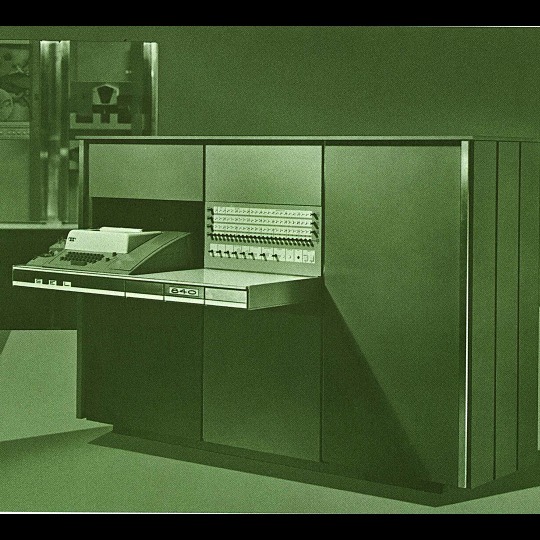
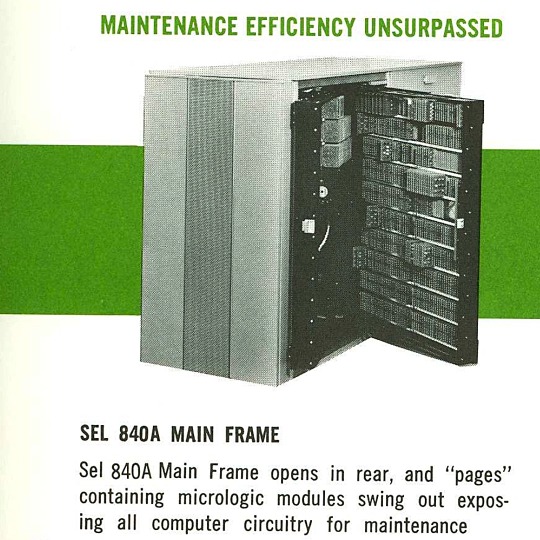
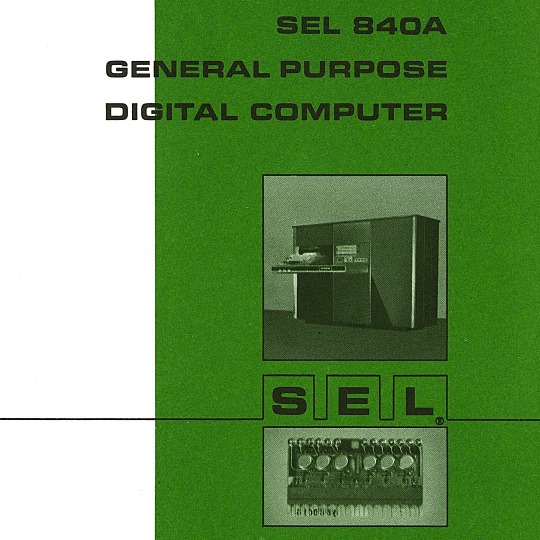
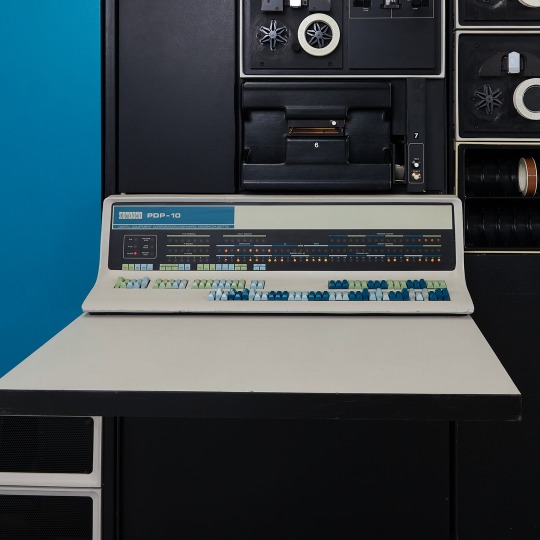

🎄💾🗓️ Day 11: Retrocomputing Advent Calendar - The SEL 840A🎄💾🗓️
Systems Engineering Laboratories (SEL) introduced the SEL 840A in 1965. This is a deep cut folks, buckle in. It was designed as a high-performance, 24-bit general-purpose digital computer, particularly well-suited for scientific and industrial real-time applications.
Notable for using silicon monolithic integrated circuits and a modular architecture. Supported advanced computation with features like concurrent floating-point arithmetic via an optional Extended Arithmetic Unit (EAU), which allowed independent arithmetic processing in single or double precision. With a core memory cycle time of 1.75 microseconds and a capacity of up to 32,768 directly addressable words, the SEL 840A had impressive computational speed and versatility for its time.
Its instruction set covered arithmetic operations, branching, and program control. The computer had fairly robust I/O capabilities, supporting up to 128 input/output units and optional block transfer control for high-speed data movement. SEL 840A had real-time applications, such as data acquisition, industrial automation, and control systems, with features like multi-level priority interrupts and a real-time clock with millisecond resolution.
Software support included a FORTRAN IV compiler, mnemonic assembler, and a library of scientific subroutines, making it accessible for scientific and engineering use. The operator’s console provided immediate access to registers, control functions, and user interaction! Designed to be maintained, its modular design had serviceability you do often not see today, with swing-out circuit pages and accessible test points.
And here's a personal… personal computer history from Adafruit team member, Dan…
== The first computer I used was an SEL-840A, PDF:
I learned Fortran on it in eight grade, in 1970. It was at Oak Ridge National Laboratory, where my parents worked, and was used to take data from cyclotron experiments and perform calculations. I later patched the Fortran compiler on it to take single-quoted strings, like 'HELLO', in Fortran FORMAT statements, instead of having to use Hollerith counts, like 5HHELLO.
In 1971-1972, in high school, I used a PDP-10 (model KA10) timesharing system, run by BOCES LIRICS on Long Island, NY, while we were there for one year on an exchange.
This is the front panel of the actual computer I used. I worked at the computer center in the summer. I know the fellow in the picture: he was an older high school student at the time.
The first "personal" computers I used were Xerox Alto, Xerox Dorado, Xerox Dandelion (Xerox Star 8010), Apple Lisa, and Apple Mac, and an original IBM PC. Later I used DEC VAXstations.
Dan kinda wins the first computer contest if there was one… Have first computer memories? Post’em up in the comments, or post yours on socialz’ and tag them #firstcomputer #retrocomputing – See you back here tomorrow!
#retrocomputing#firstcomputer#electronics#sel840a#1960scomputers#fortran#computinghistory#vintagecomputing#realtimecomputing#industrialautomation#siliconcircuits#modulararchitecture#floatingpointarithmetic#computerscience#fortrancode#corememory#oakridgenationallab#cyclotron#pdp10#xeroxalto#computermuseum#historyofcomputing#classiccomputing#nostalgictech#selcomputers#scientificcomputing#digitalhistory#engineeringmarvel#techthroughdecades#console
31 notes
·
View notes
Note
figured u were going to be the closest to solving this hypothetical, so, here's the situation: an autonomous sapient robot wishes to listen to an audio file (of music)which is stored within a drive it has access to, not just to review the contents of it but to relive the experience of it. It decides to do this by playing the audio out loud, so that it can relive the process of processing the input sounds all over again. SO THE QUESTION IS: would this only work with traditional speakers. Or can computers process radiowaves in the same manner?
(this is abt rei, not u btw. u don't seem like the sentimental music-listening type, no offense)
[RESPONSE: UNIT S.E.N-KU_v1.03]
Inquiry received: Hypothetical analysis regarding autonomous sapient robots, audio file playback, and experiential memory recreation. Clarification: Subject of inquiry is "Rei," not this unit. (Observation: None taken. Emotional attachment to music is a known cognitive inefficiency.)
Answer:
Playing the file aloud through traditional speakers would indeed allow the robot to reprocess the experience via its auditory input systems.
Traditional speakers convert digital signals into mechanical vibrations (air pressure changes) — tangible, physical phenomena.
If the robot’s auditory sensors are designed to detect externalized air vibrations (as with human ears), then yes: it would re-experience the sound just as an organic listener would, creating a new sensory event separate from memory access.
In short: Playing music aloud is an effective method to relive it externally.
Regarding Radiowaves:
Radiowaves do not inherently recreate a sensory experience unless first converted into mechanical sound waves.
Directly processing radiowaves (electromagnetic signals) would bypass the external physical sensory input phase and access the data directly—more like reading the blueprint of the experience than feeling it.
Processing radiowaves without translation would be like reading sheet music without hearing the notes.
Summary:
Traditional speakers = reliving the sensory experience through physical input. Direct radiowave processing = data retrieval, not experiential recreation.
Additional Commentary:
If Rei wants to feel the music the way humans do, external playback through mechanical vibration (speakers) is necessary. Otherwise, it's just simulation. Not sensation.
[END TRANSMISSION]
#dr stone r#dr stone rp#drst#mecha senku#mecha senku says!#dcst rp#dcst rp blog#drst rp#dcst senku#senku dr stone#dr stone rp blog
8 notes
·
View notes
Text
RotTale: Grief

story is below the cut! please lmk what you think, i had a lot of fun with the world building!!
The quiet hollowness of the Palace hallways is interrupted by the clanging footsteps of the Royal Captain. Her rusting armor boots shake the ground as Undyne makes her way to the Throne Room. When she’d gotten the call about the explosion, her first thought was to run to the Lab. But she had to check in with Asgore; He’s have gotten the initial damage and survivor reports. With any luck, Alphys and her partner are already at the Capital Hospital. With a sweeping hand she throws the Throne Room doors open and stops, staring the King down.
"Where are they?" She asks quietly. Asgore takes a moment longer to look at Undyne before sighing and waving her to the far end of the room and walking out.
She follows without a word, watching the fur along the bottom of Asgore’s robe collect dirt as it drags behind him. She is glad to be wearing her helmet, because Undyne knows Asgore wouldn’t tolerate the weakness which she knows reflects on her face. No words are spoken as the two Monsters make their way to the guest rooms.
At one point, when Undyne was a tiny little thing, the Palace halls were full of people. She remembers going with her father to diplomatic meetings with the King, when the Underground wasn’t united and was ruled by separate political powers. The parties that were thrown made some of her fondest childhood memories. The shuttered windows to the courtyard and broken floor tiles seem to mock all that now.
Finally, Asgore stops at the last door. He looks at Undyne with something she can’t quite place before knocking softly.
“Sans?” he asks, “May I come in?” When no answer comes, he opens the door anyway.
Sitting on the only bed in the room is a small skeleton Monster. He barely looks like a teenager, Undyne thinks. She looks around, but only sees Sans. A heaviness begins to take root within her. Where’s the damage report, she thinks as she stares at the Monster on the bed. The survivor report?
“How are you feeling, Sans?” The King asks. Sans still doesn’t respond; he simply stares at the foot of the bed blankly. One half of his face is wrapped in bandages, and his too-big clothes seem to be burned in multiple places.
“Where’s Alphys?” Undyne asks. “Is she in a different room? Can I see her?”
Asgore says nothing, just looks at Sans whose eyelights have suddenly gone out.
“Your Majesty?” Undyne pushes. “Where is she?”
_____________________________________________________________________________________
The walk to Hotland is sweaty and nervous. The King leads her to lower and lower levels before they finally reach the Royal Laboratory. The doors slide open when Asgore inputs a code, and Undyne is greeted with an empty lab gently lit by the lava below.
The warm light reveals a mess; metal panels are strewn about and even melted in some places, the computer screens are cracked and spitting electricity and there are burn marks everywhere, as if a large explosion had happened. She follows the scorch marks, Asgore following, and comes face-to-face with the CORE. The bright, off-white magic pulses as Undyne looks around. There’s nothing but burnt papers and warped railing. The heaviness in her stomach gains weight and with it a quickly-emerging terror. She turns to look at Asgore.
“Where is she?”
“There’s nothing left of her.” He finally answers, quietly.
The world is still. There’s a ringing in her ears, muffling the bubbling of the lava below them as Undyne looks around again. Sweat drips down her face and settles on her helmet with a hiss-turned-steam. More of it drips down her hair. “What do you mean?”
“You’re not stupid, Undyne. The explosion erased her completely. There wasn’t even dust to collect. I’m sorry.” And she thinks he might actually look sorry - his eyes look the way she remembered when her father was assassinated and she was left alone, clutching the dust that hadn’t been swept away in the river when he first found her.
She doesn’t even realize she’s screaming, breaking things until she’s jerked to the ground by the King, and as he holds her down his face is suddenly stern.
“Enough.” He bellows. Undyne stops thrashing, and just stares. “I understand your grief, but there is no time to be acting like a child. I taught you better than that.” He rises up again and Undyne sits up, staring as he continues. “We have the Barrier to protect, as well as our people. We cannot let anything like this happen to our citizens. You will take Sans home, and then we will meet in the Throne Room tomorrow to discuss what to do with the Lab - no one is to come inside until then.” He walks toward the open door, then stops for a second.
“I really am sorry, Undyne.” With that, he disappears to the upper levels.
Undyne stays sitting on the scorched floor, staring, staring. The CORE surges with light for a quick second and she thinks it’s going to explode again, before it settles down. Then it does it again. She finally looks at it.
The CORE pulsates softly, almost like a soul-beat. The soft, yellowish-white magic emitting from its hollow eyes feels comforting, almost familiar. With a shaky, deep breath, Undyne stands up and looks around again. There has to be some trace of Alphys left; there can’t truly be nothing. And it doesn’t make sense; how did Sans survive the explosion of the CORE while Alphys didn’t? She looks at the burnt papers, the sparking computer screens and the torn-out panels. Something besides the explosion happened here - she just has to figure out what.
She spends the next few hours digging through the remains of the Lab. Her armor is in a pile by the door, having shed it a long time ago because of the heat. She’s taken apart almost everything in sight, for any potential evidence of what happened here.
She’s so distracted by her personal mission she doesn’t even notice the shadow in the door until it moves forward. She whips around and summons a spear, aiming it. “No one is allowed in here!” She yells. Then she stops, when she notices it’s Sans.
He’s still wearing his shirt, torn and burnt like his arms, though those have been wrapped in bandages like his head. He jumps when he sees her, stumbling back and hitting the wall next to the door, managing to hit the keypad and closing it. They stare at each other for a second.
“What are you doing here?” Undyne demands, still holding the spear.
“I… I forgot something in the break room. It’s my little brother’s.” Sans mutters, pointing to a door on his far left. Undyne had tried that door but didn’t know the code, so she gave up after getting the code wrong every try. She even tried to break into the room, but only succeeded in denting the metal. Resting her spear against her side, she walks to the door and nods Sans over.
“Open it, then.”
And he does, inputting the code too quick for her to decipher, and it slides open with a squeal that makes both Monsters cringe. The lights seem to somewhat work here, blinking and buzzing but on. Undyne lets herself in first, finally putting the spear away as she looks around the room. On the far side is a white table with three empty mugs and a notebook in Alphys’ handwriting that she picks up and looks through. It’s mostly full of notes and doodles of some anime characters, but nothing of immediate notice. She takes it anyway. When she turns, Sans it by a set of large lockers, digging through an open one for something.
“What are you looking for?” She asks, feigning interest. Sans glances at her before going back to the locker.
“It was a… a book I bought yesterday. Paps loves when I read him bedtime stories, and I saw one I thought he’d like at the market yesterday.” He explains.
“How old is he?” Undyne asks as she moves to a locker herself. She crushes the lock in her hand and it swings open
“He’s seven,” Sans answers, “he’s the coolest.”
Undyne hums. More notebooks in this locker, full of drawings and equations. She takes every one. As she’s pulling the notebooks out and setting them on the table she asks, “Does he know you killed Alphys?”
Sans drops the book he’d finally found and stares at Undyne for a long moment before answering, “I didn’t kill her. She-she was closest to the… explosion.”
“Bullshit.” She punches the locker in front of her and the door gives in to the force, warping around her hand. “There’s not a single trace of her and you’re here, in perfect shape. You did something.”
“No, I-I didn’t!”
“Then where is she!? Why isn’t there even dust !?” Undyne surges forward and grabs Sans by his shirt, lifting him off the ground. He grabs her wrist and kicks his feet uselessly. “What did you do!?”
“Nothing!” He shouts back.
”Liar!”
Sans’ hands holding her wrist start to glow blue and they are both thrown away. Undyne hits the table and brings it with her as she skids across the break room. The notebooks she had just collected scatter to the floor. She looks over to Sans, who had hit the coat rack and brought it down with him when he hit the wall. He’s holding his head in pain, tears in his uncovered eye. Undyne slowly lets go of the table and stalks forward until she’s in front of Sans again, crouching down and placing her hands above him to prevent him from escaping again,
All-too-calm, she asks him, “What happened here, Sans?”
“I-I don’t know.” He whispers back, eyelight gone.
Undyne pushes herself up and walks over to Sans’ locker, picking up the book that he’d dropped. She tosses it to him. “Walk yourself home. I’m gonna find out what happened here, and what part you had to play in it.” She walks back to the notebooks and listens to him stumble his way out of the Lab.
She has files to report.
_____________________________________________________________________________________
Undyne is covering a shift for the usual Snowdin guard when she sees a lone skeleton at the edge of the forest leading to the Ruins. He’s at least seven feet tall, wearing too-small sweatpants and a sweater with the same story. He’s punching a dead tree, and doesn’t see her coming up. She has an idea of who this skeleton is.
“Your form is wrong.” She tells him, stopping a few feet away from the tree. The skeleton startles and whips his whole body around, smiling widely when he sees her.
“You’re Undyne!” He exclaims. “Captain of the Royal Guard!” After jumping up and down a few times he stops, clears his throat, and sticks a cut-up hand out. “I’m Papyrus!”
Undyne doesn’t take his hand, instead uses both hands to ball it into a proper fist. She turns his back to the tree, where she can see a few pieces of bark have started to chip off. “Keep your hand like this,” She instructs him, “Then put your feet like this.” She taps his feet until he moves them correctly. “Now throw with your whole body, not just your shoulder.” She takes a step back and nods to the tree. He blinks at her for a second, before giving the poor dead tree a determined look and swinging.
The impact of the punch echoes throughout the cavern, and after a moment the trunk of the tree splits and slowly falls. Undyne and Papyrus watch the tree hit the ground with an upkick of dust, and Papyrus turns back to her. Holy shit, that’s impressive. The passerby on the roads nearby disagree, if the yelling and cursing is any indication.
“Wowie!” He shouts! “That’s so much better than how I was doing it! What else can you teach me?” Undyne gives the skeleton a quizzical look through her helmet.
“Why do you want to learn to fight?” She asks.
Papyrus sighs, shoulders deflating. “... My brother,” he starts. “For as long as I can remember, he’s been… scared of everything. I think it has to do with his accident when I was a child.”
Undyne’s eyes narrow. She knew it. This is Sans’ brother.
“So you want to… What? Protect him?”
“He’s done so much for me since our father disappeared. I want to pay him back by showing him that I can keep him safe. Nothing like that will happen again on my watch!” He puffs out his chest proudly.
The edges of a plan begins to formulate in her head. “How old are you?” She asks
“I just turned seventeen two months ago!”
A bit young, but she started younger.
“You could work on your form more.” She pats the belt on her armor then looks back at Papyrus. “You got a pen or something?”
He pats his own sweatpants pockets and turns them inside out before shaking his head. “I’ve got one at my house! Follow me!”
Without a word he bounds off, steps a bit too big for Undyne to keep up while walking, so she jogs behind. The people they pass give way for her, some throwing dirty looks. She hears what some people call her from the dirty sidewalks, the whispers. They’re older folk, so she can’t feel too bad. After all, the Underground was only united around thirty years ago - they’re used to their own leaders, not the Monarch.
Finally, when the houses and apartments begin to taper out, Papyrus stops. It’s a worn, barn-red house with shoddy tiles and cracked windows. There’s an old yellowing light on somewhere inside, and as Papyrus opens the creaky door and lets her in, Undyne sees it’s from the kitchen.
“Now, I know it’s here somewhere…” Papyrus mutters to himself as he digs through the messy living room. There’s a single sock on the floor surrounded with sticky notes. The house has a slight funky smell to it that she can’t quite place. “One second.” Papyrus tells her, then turns to look at the ceiling. “Sans!” He calls out, so suddenly that Undyne startles a small bit.
“Sans! Have you seen the pen? It’s the only one in the house! The Mettaton one!” Papyrus calls out again. After a few moments, there’s the sound of a door opening and the sinking feeling from ten years ago bubbles back up like lava, flowing beneath a scorched platform.
Sans comes down the stairs slowly, holding a glittery pink pen up in the air.
“I got it right here, Bro. I was writing something earlier and forgot to put it back-”
He stops. Stares. She meets his gaze through her helmet.
“Captain Undyne showed me how to punch!” Papyrus exclaims gleefully as he meets his brother to snatch the pen from his dropping hand. “Then she asked for a pen because she doesn’t have one and I didn’t have one in my workout clothes so I told her to follow me to our house so I could give her a pen!” Finally he stops, then turns to face Undyne. “Why did you need a pen anyway?”
Undyne stares at Sans a moment longer then turns to Papyrus as he hands the pen to her. “I told you that you needed to work on your form. I was going to give you my address so I could help you work on it.”
She watches the taller skeleton’s eyes grow cartoonishly large. “Really!?” Then she watches as both of Sans’ eyes (she can see the damage on him now that he’s bandage-free) go dark.
“You have potential.” She shrugs as if it’s no big deal, as if she’s not planning. “With me as a guide, you’ll climb through the ranks quickly.”
“Paps, I don’t think that’s a good-”
“Nonsense, Sans! This is perfect! You can stay at home or work your hot dog stand down the street and I can keep you safe!”
“You- wait, what?” Sans blinks at that, eyelights coming back. “You don’t need to keep me safe-”
“Of course I do! You always look behind yourself when we’re outside, if I learned to fight properly then you won’t have to-”
“I’m your big brother, I should be the one protecting you-”
“You barely even leave your room besides to work-”
Undyne listened to their argument as she searched for something to write on. She finds a napkin on the kitchen counter (looks used. Gross, but it’s all she can find) and quickly writing on it. When she comes back they’re talking over each other so much she can’t understand them.
The shouting match is abruptly stopped by something hitting the front door and a voice down the street yelling at them to shut up. She takes her chance to give the napkin to Papyrus.
“This is the address. We’ll start tomorrow, ten o’clock sharp. Don’t be late.” Papyrus seems to ignore the fight with his brother and nods brightly. She turns to the shorter skeleton “Good to see you again, Sans.” They both know it’s a lie. She takes her leave from the old house, a single thought in mind:
You take away my family, I’ll take away yours.
#my art#undertale#undertale au#rottale#rottale asgore#rottale papyrus#rottale sans#rottale undyne#story#ill probably end up drawing what each part of the underground looks like#the idea of what it looks like is stuck in my head#so youll have to deal with it too#utmv#utau
10 notes
·
View notes
Note
what in the world is a lich vacuum tunnel skeleton computer? it sounds cool as hell
powerful necromancer commands an army of the undead. said undead can be given rudimentary commands. by organising multiple undead to pass, say, metal rods between each other, you can create simple logic gates - order two undead to pass along any rods they're given, and order the third to only pass along a rod if both undead pass a rod to them, then you've got an AND gate. knowing this, our humble lich retreats to a mountain and sets their minions to work. they raise a large army of skeletons, tunneling out a series of inter-connected circuits inside the stone, and stationing these skeletons along the entire length, at arms length from each other. at a command, metal rods are passed to the input skeletons, which immediately hand them forwards, and on and on, passing through successive skeleton logic gates, forming an arithmetic unit, which are then passed to the output skeletons, which present our lich with a numeric solution, in binary. such a system can be extended and expanded as much as necessary. to reduce the effect of air resistance on our speedy skeleton stick slingers, the lich seals off the tunnels and further employs some skeletons to work bellows to constantly pump out the air and create a partial vacuum.
see also the feudal chinese version with dessicated alien peasants as presented in three body problem, for calculating celestial and astronomical movements
61 notes
·
View notes
Note
Can you please explain anti stall?
Anti stall is a system that keeps the engine running and engages the clutch when the revs(revolutions per minute) go too low. This keeps the engine running at a higher gear. If the car slows and the gear also drops accordingly then there is risk of the engine stalling out. This keeps the engine running at the pace needed to recover the car. There is a time limit built into the system, so if a driver crashes the engine is not kept running indefinitely. It requires that driver input if they are able to keep driving.
If there wasn't this system then a driver would be at risk of their engine stalling every time they spun out or lost speed. It would make it less likely for them to be able to recover from mistakes.
A driver has to manually disengage the clutch to turn off the anti-stall.
This is mostly relevant when a car is stopped at the start of the race, or when they spin out and slow suddenly.
It's a system that is part of the ECU(electronic control unit)
The reason the anti-stall was triggered on Charles' car in Austria(2024) is likely because the engine switched off, which would have dropped those revs low and the computer would be trying to keep the engine running. This of course was futile as the issue for the loss of speed was the engine. It's something the team need to look at.
The anti-stall in this instance was a symptom not the problem.
24 notes
·
View notes